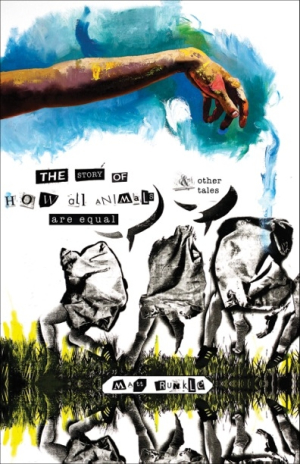The Story of How All Animals Are Equal
And Other Tales
Flashes of characters’ inner narratives reflect on human nature with exquisite prose.
Matt Runkle presents a selection of fictions that are as intimate in detail as they are wide in scope and variety in The Story of How All Animals Are Equal and Other Tales. Runkle’s writing has appeared in The Collagist, Beecher’s, Monkeybicycle, and other journals, but there’s a rhythm and grace to the order of his stories in this collection, only detectable when presented as a whole.
Some stories, particularly the shorter ones, are more like poems in some ways. They don’t boast much plot—these are more like vignettes, hints at the lives of characters who come and go throughout the book, often while leaving an indelible mark on the reader. In one of these, “Laramie and Rudyard,” a simple two-page profile of a gay man at a sporting event, Runkle quickly but expertly fleshes out a character who tries unsuccessfully to pass himself off as just another fan in the crowd:
“Though the rules were complex, the art of spectating is an easy one to bluff, and Laramie could be convincing when called upon, to the point where even he himself had felt sincerely rapt. The spells we cast upon ourselves, however, break harder and faster than most. Laramie, drunk, collapsed at last in laughter, and at the very height of overtime suspense, stood up and briefly danced.”
The longer stories contain more complex scenarios, but Runkle’s work is still less about traditional event-upon-event storytelling than contemplative, character-driven inner narratives.
Runkle is not afraid to experiment, though the results can vary widely. A one-page “Toy Story” profiles two toy characters, Monchichi and Madball, in a break room at work. The conceit is a novelty but doesn’t seem to have a larger purpose. Still, Runkle has a gift for delicately crafted prose, and there are passages that read so exquisitely that they are worth the price of the book in themselves. Any unevenness in this collection can be attributed to boldness—easily forgiven and an indication of potential yet untapped.
Reviewed by
Peter Dabbene
Disclosure: This article is not an endorsement, but a review. The publisher of this book provided free copies of the book to have their book reviewed by a professional reviewer. No fee was paid by the publisher for this review. Foreword Reviews only recommends books that we love. Foreword Magazine, Inc. is disclosing this in accordance with the Federal Trade Commission’s 16 CFR, Part 255.

